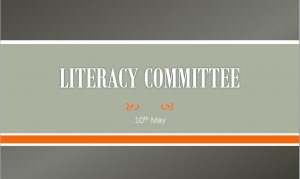Every day we see that literacy is the catalyst for positive change. It allows individuals to develop their knowledge and potential, earn their livelihood, participate fully in their community and wider society, and enjoy continuous learning and the fullness it brings to their lives.
Source: http://www.literacyworldwide.org/get-involved
Literacy at Emerald Secondary College 2015
The new Literacy Committee are known as COW – Coalition of the Willing. We invite all teachers from ESC to offer input at any stage as we progress on our literacy journey, and our quest for a whole school approach to literacy.
Thanks to Ange for our logo..
Here you will find updates on each meeting…
COW Meeting Thursday July 30th
Meeting with Esther Weichart Wednesday August 19
Questions to Esther:
Whole school approach – how to begin?
3 pronged approach…
- Teacher Professional learning in understanding Literacy – subject specific and school wide literacies.
- Literacy across the curriculum for all students – that can be identified eg: Composing text/Comprehending text. Seen in the learning sequences.
- Intervention – close the gap for students who are 2 levels below
PD for staff – what do they need to know?
A number of PDs – across composing and comprehending texts
- Learning sequences need to be scaffolded
- Letter level
- Word level
- Sentence level
- Text level
- Marzano’s academic vocabulary.
- Genre frames
- Paragraph frames
- Spelling strategies..
What data to look at – what should we be looking for?
- Use ODT data to determine the 4 instructional groups
- 2 levels below – triangulate to ensure that this is accurate
- Then use other tests to determine needs.
- English reports – compare to ODT.
- ODT tests all of the skills addressed in AC
- The Learning sequences at ESC need to address all of these.
What experience does Esther have with students with diagnosed learning difficulties – and what works?
Intervention program – employ someone or train someone – we already have RAC in the school.
BAT – Considerations
Can students catch up work missed if they are withdrawn from a range of classes.
- Giving work to Colleen
- Are they still developing the skills that are on the map?
- Are they developing skills to enable them to keep up in class
- Logistics – if you withdraw all of the students – nightmare!!
Intervention most effective – 7 times per week
- What’s the next best alternative for the student?
- Withdrawal from LOTE?? Time table issues where LOTE not timetabled in the same bock.
- OR withdrawal for an amount of time across all subjects
RAC – Dyslexic testing from DEECD
- To agree as a school that we need a program – how to facilitate?
- Who to lead? Give them support, time, PD, network
Testing – other tests require one to one time
- Lyndale/Hampton Park
- ACER testing – PATR, writing, spelling
- Triangulate the data.
- If there is a problem, student receives intervention.
- Intervention teacher does extra testing – probe/begin with base text, pronunciation…
- Goals for individual learning plan
- CEO literacy intervention – great program
Literacy needs to be part of the Learning landscape…
Multisensory approach
- Orton Gillingham program/approach to small group withdrawals
- Program – Sonday (based on Orton Gillingham approach – fill the knowledge gaps, phonetic awareness – learning of spelling rules)
Alignment with the Australian Curriculum
The course aligns closely with the Australian Curriculum: Literacy capability and the Language and
Literacy strands of the Australian Curriculum: English. The Literacy capability states, while much of the
explicit teaching of literacy occurs in the English learning area, it is strengthened made specific and extended in other learning areas as students engage in a range of learning activities with significant literacy demands (ACARA 2012).
In particular, the Language strand in the English curriculum where ‘students develop their knowledge about the English language and how it works’ is new learning for many teachers.
Literacy Committee 2012
Click on the headings to access these literacy documents
Effective Strategies for Teaching Literacy Across the Curriculum
Research based strategies for improving literacy
Presentation by Rebecca Williams, May 10th:

